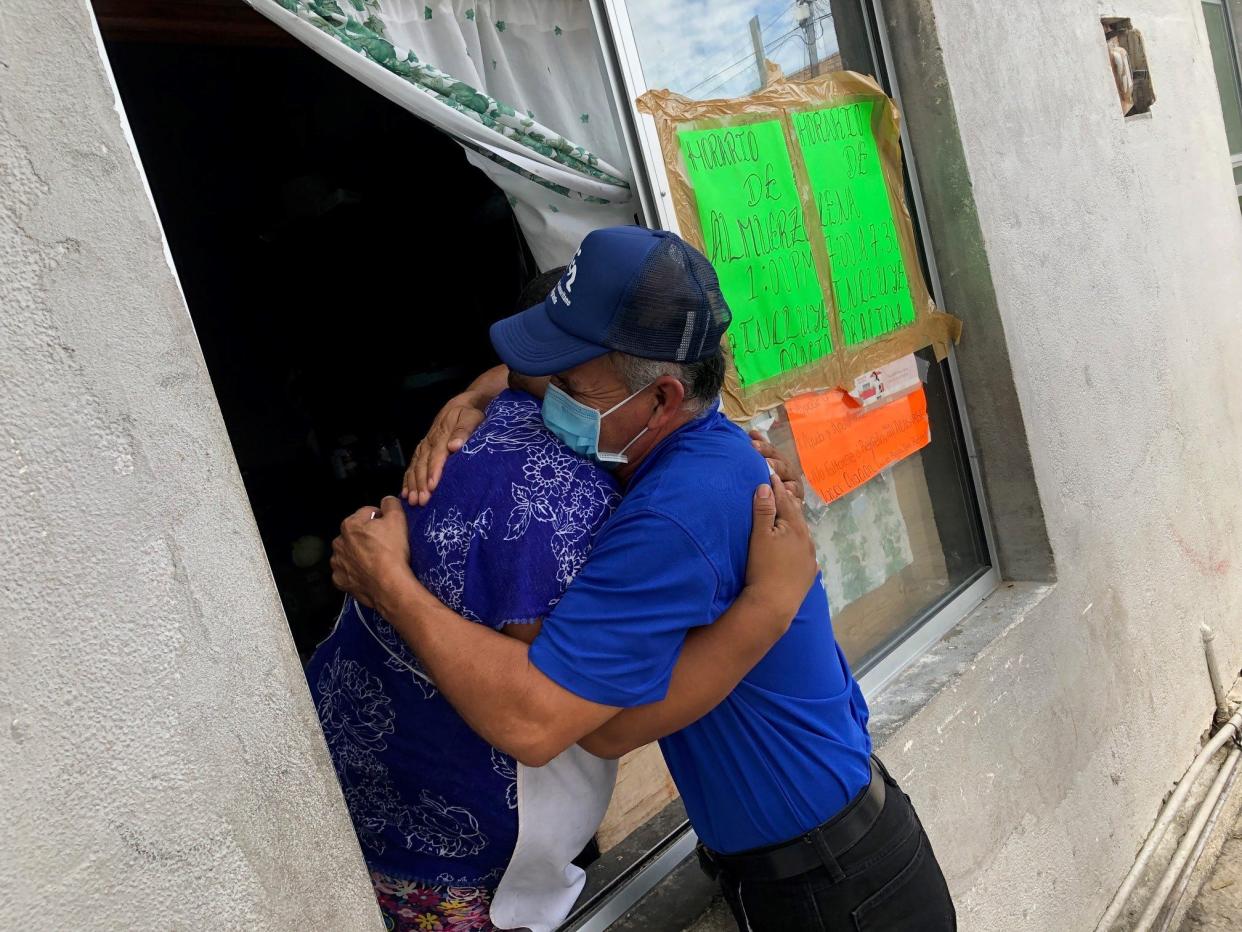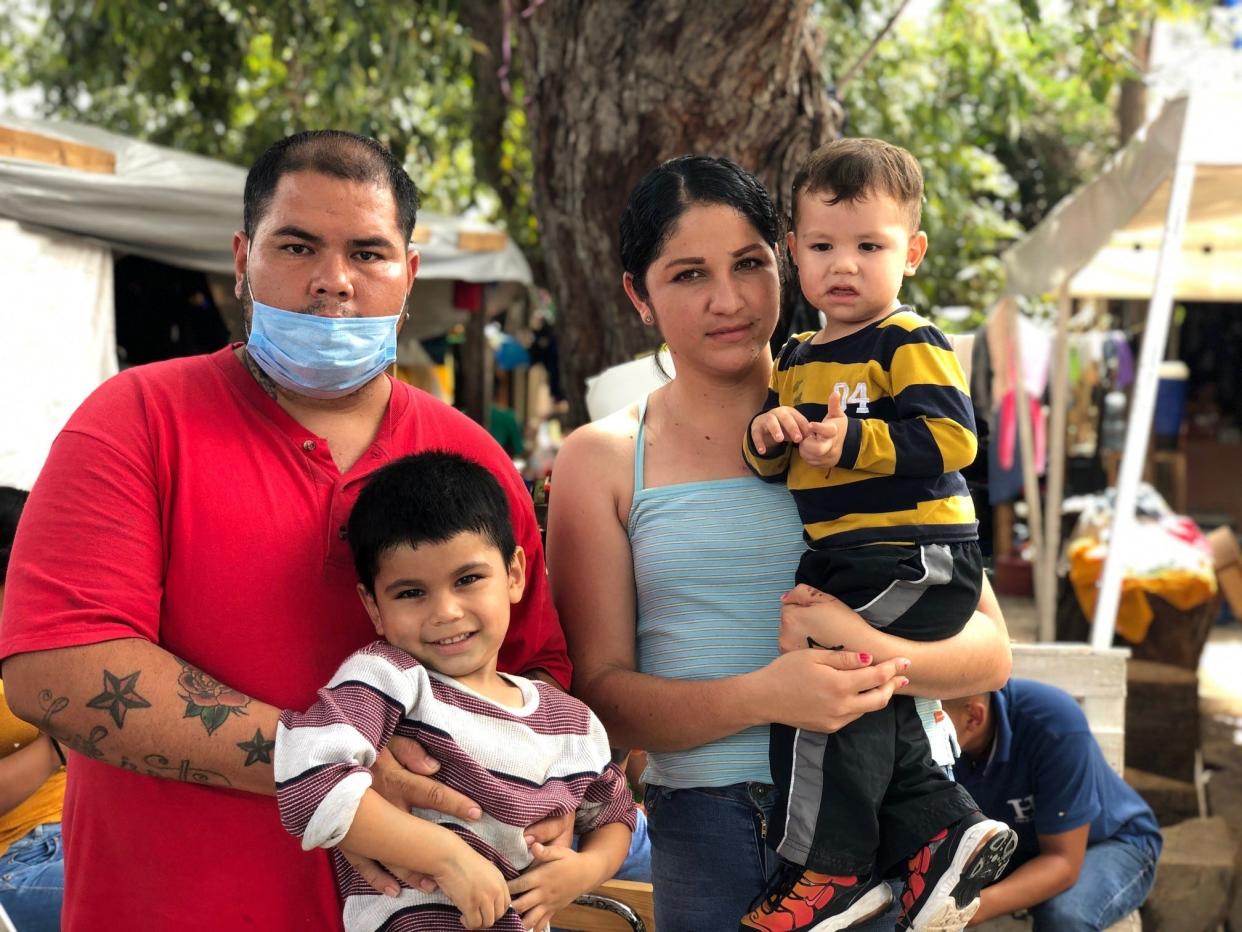Biden campaigned against Trump's Mexico border policy. Now he's relaunching it

NUEVO LAREDO, Mexico – Oscar Aviles Ochoa, 32, fled Michoacan, Mexico, in August with his wife, Brenda Figueroa, 26, and their two sons, José, 3, and Jesus, 1, after men brandishing long rifles showed up at the avocado farm where he worked and tried to extort money from him and threatened to kill him. They took a bus to Nuevo Laredo and have been waiting at a border shelter ever since, hoping to cross into the United States to legally request asylum.
Shortly after arriving, they watched as gunmen ordered a family of 10 migrants across from the shelter into vans and whisked them away, Ochoa said. They're too scared to venture outside of the shelter.
Waiting in Nuevo Laredo, he said, is just as perilous as the danger they fled.
"If I could await my U.S. asylum case in a U.S. jail, I would go," he said. "It's safer in a jail than it is here."
Next month, the Biden administration is expected to relaunch a controversial Trump administration policy, known as "Remain in Mexico," that requires most migrants like Ochoa and his family to stay in Mexico while seeking asylum instead of waiting in the United States for their court hearing.
The policy shift has raised alarm from migrants, activists and other allies who point to the growing dangers migrants in Mexico face amid cartel violence, poverty and other difficult conditions. Human Rights First last year counted more than 1,500 cases of migrants kidnapped or attacked while in the program.

President Joe Biden campaigned against such policies and halted Remain in Mexico shortly after taking office. But Texas and Missouri, both Republican-led states, filed suit against the Biden administration, claiming the abrupt policy reversal led to more migrants crossing the border.
A U.S. District Court judge in August ordered the Biden administration to restart the policy, and the Supreme Court upheld that decision. The White House is appealing. On Oct. 14, a Biden official filed a court brief stating that the federal government plans to abide by the judge's order and relaunch the policy in mid-November in Laredo and Brownsville in Texas, pending approval from Mexico.
Biden's decision to restart the program has bristled immigrant advocates who, up until now, have worked closely with the administration to implement policies considered more humane than those of former President Donald Trump. Earlier this month, a group of advocates walked out of a virtual call with top Biden officials in protest over the policy's relaunch.
Some advocates, already angered over Biden's continued use of Title 42, another Trump-era policy that allows border agents to quickly expel asylum seekers to Mexico without due process to prevent the spread of the coronavirus, said they had lost faith in the Biden administration's stated goal of making fairer immigration rules.
"This administration continues with policies that they themselves denounced as cruel and inhumane," said Tania Guerrero, an attorney with the Catholic Legal Immigration Network based in Ciudad Juarez, Mexico, across from El Paso.
Many of her clients in the Remain in Mexico program have disappeared or been killed in Ciudad Juarez while awaiting U.S. asylum hearings, she said.
"I'm exhausted," Guerrero said. "I can't go to another session where [Biden officials] thank us for our work, absorb all of our ideas – and do nothing."
Besides exposing migrants to Mexican cartels, the Remain in Mexico program makes it difficult for asylum seekers to get access to legal representation, advocates said. Many U.S. lawyers won't risk venturing into dangerous Mexican towns to speak with their clients, making it harder for them to win asylum cases.
Of the more than 45,000 cases tracked by the Transactional Records Access Clearinghouse at Syracuse University, a research group in New York that tracks U.S. immigration cases, only 10% had legal representation and only 733 – or 1.6% – resulted in asylum, according to the group's data.
In his court filing, Blas Nuñez-Neto, Homeland Security's acting assistant secretary for border and immigration policy, laid out steps his agency is taking to shorten wait times for hearings and improve access to lawyers, including erecting temporary courts in Brownsville and Laredo at a cost of $14.1 million.

But the policy remains a dangerous initiative designed to deter migration and places asylum seekers' lives at risk, no matter which administration is running it, said Eleanor Acer, director of Human Rights First's refugee protection program.
"There's no way to make a program that is inherently unsafe, safe," Acer said. "It's not fixable."
In a statement, a Homeland Security spokesperson said the department is complying with the court's order to reimplement the policy and is in ongoing talks with Mexican officials to accept the expelled migrants.
"The Department remains committed to building a safe, orderly, and humane immigration system that upholds our laws and values," the statement said.
Alysha Welsh, an attorney with Human Rights First who has represented asylum seekers in the Remain in Mexico program, said she expects migrants to face the same challenges in accessing legal help that they did under Trump.
A family she represented in Nuevo Laredo last year saw her just once for 30 minutes at a temporary tent courthouse in Laredo. Her organization wouldn't allow her to go across the border to meet with her clients in person. The day of their hearing, the court tent was filled with around 40 asylum seekers, she said. She and another attorney were the only lawyers there. Her clients' asylum claim was denied.
Welsh said she and other advocates have been disappointed the Biden administration has extended Trump-era policies, even after advocates pointed to Remain in Mexico and Title 42 as the top two policies that needed reversing.

"This administration came into a very large mess of things to clean up," she said. "It’s a year later and Title 42 is still happening and MPP (Migrant Protection Protocols) is restarting. Disheartening is a great word for it."
Migrant Protection Protocols is the official name of the Remain in Mexico program.
Lorenzo Ortiz, pastor of El Buen Samaritano Migrante church in Laredo, was ebullient when the Biden administration halted the Remain in Mexico policy and many of the migrants who had been stuck in Nuevo Laredo for months under the program were allowed into the United States to await their immigration hearings.
For a while, immigration flows at the international bridge returned to normal and even those expelled under Title 42 were processed through, he said. But all that came to a halt around June, and migrants began filling his shelters again. Then the news of the return of Remain in Mexico reverberated through his shelters.
"We thought we were past that," Ortiz said.
On a recent afternoon, he loaded his van with a cooler filled with 20 pounds of frozen chicken, water bottles, hand sanitizer and 2x4 wood planks to build extra beds, and then drove across the border into Nuevo Laredo.
The cartels know he's sheltering migrants but don't bother him, Ortiz said. Many of the migrants have paid some fee to the gangs to stay at the shelters, he said.
"It's sending people to the cartels so they could be kidnapped," Ortiz said of the Remain in Mexico policy. His shelters, with a capacity of 150 people, are already overflowing with more than 340 migrants. "It's going to put a lot of people at risk."
At one of the shelters, toddlers in diapers scampered across an open patio as their families ate chicken soup. Men and women approached Ortiz, asking for updates on asylum rules or seeking his advice. Children squealed, "Pastor!" and ran up for hugs. Women and children crowded into makeshift outdoor bunkbeds.
The shelter, a two-story concrete building adjoining an open-era patio, normally holds around 50 people. On a recent afternoon, around 220 people were staying there.

Sandra Garcia, 34, of Michoacan had been living at the shelter since September with her 10-year-old daughter, Fatima Hernandez. The two fled their hometown last month when criminal gangs kidnapped Garcia's 17-year-old son and threatened to snatch Fatima next.
They went to the international bridge to seek asylum in the United States but were rebuffed by U.S. immigration agents, she said, so they retreated to the shelter.
She's been afraid to leave the shelter's concrete walls for fear of being picked up by local cartels. Last week, a man was dumped at the shelter, beat up and bleeding. The shelter's workers ordered everyone inside the two-story building. Two weeks ago, a gunfight broke out down the street.
Remain in Mexico would prolong their stay in this dangerous border town, Garcia said.
"We left danger and now we're in more danger," she said. "We thought the United States would help us."
Ortiz said he recommends patience to the migrants who approach him, pleading their case. In a few weeks, he told some of them, we may know more.
Truth is, he doesn't know when or if the situation will improve, he said. If Remain in Mexico is relaunched, Ortiz said he expects more people in his shelters – and more targets for the cartels.

"These are people running away to save their lives," he said. "They should be in the U.S. awaiting their case."
Follow Jervis on Twitter: @MrRJervis.
This article originally appeared on USA TODAY: Trump Mexico border policy adopted by Biden could put migrants at risk
